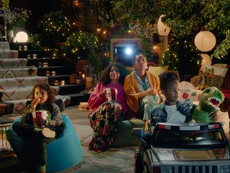The outrage over Sainsbury’s Christmas ad with a black family proves it: racism in the UK never stopped
In Britain, the elusive racist, like Bigfoot or the dragon, may be a mythical creature. But the truth is, black people face their Bigfoots and their dragons on a daily basis

The racist” is a mythical creature. Ever elusive. Nobody admits if they are one. Doesn’t seem to have a face. But my God, do we hear its voice. Especially in the realm of social media.
When press officers at Sainsbury’s were pierced by the double-edged sword of trending Twitter this week, for both good and bad reasons, it rang out once more. The issue? The supermarket giant’s new Christmas advert features a family… that just so happens to be black.
I say that plainly because that’s exactly how it should have been perceived. However, the opposite was the case. As comedian Funmbi Omotayo put it, soon after the advert began to air nationwide, “all hell broke loose”.
Examples of responses include: “You may as well rename yourself Blackbury’s”, “Where are the British people?”, “You’ve managed to completely alienate the few remaining White customers you still had”.
Apparently, for some, a black family is not worthy of a Christmas advert. So it begs the question, what exactly is a black family worthy of?
I see no outrage when black people are overwhelmingly overrepresented in the UK justice system. Are we only deemed worthy of being on Crimewatch? When black mothers were revealed to be statistically more likely to die in the UK from childbirth than any other group, where was the outrage then?
Perhaps we should only be seen scoring goals in international football matches, winning gold medals at the Olympics or being token rappers at posh dos. These examples, perhaps, are more palatable for people who can barely tolerate our presence in the UK. Black people, permitted to exist as long as they are considered to be performing familiar stereotypes: the inner-city criminal, the happy-go-lucky entertainer or generally, the sole black person in the office who should be a forgettable face that might be seen around, preferably not heard, and certainly has no power. It’s far too much for black people to be included in picture-perfect, filmic Christmas adverts as ordinary British families.
The supermarket’s decision to feature a family who just so happen to be black embraces the plurality of 21st-century Britishness. Being both black and British hasn’t suddenly become incompatible. Rather, the discomfort many feel at being confronted with that reality is part of an issue that has been bubbling under the surface for decades: the myth that no racism exists in the UK.
All year, the counter-narrative being pushed back on UK Black Lives Matter protests is that Britain is not racist like America, so what exactly do black people have to complain about?
One glance underneath the Sainsbury’s advert tweet and you’ll see this question is redundant. The real question is why is this level of racism still happening in 2020? Brexit, populism and the media are lazy suggestions that have been bandied around as so-called excuses. But the truth is, this is an issue of education.
Just recently, I was asked very innocently by a young lady “do you speak Nigerian?” I wasn’t offended because I knew it was down to a lack of understanding. She didn’t know that the British empire jumbled together ethnic tribes to invent a new contrived country on which the English language would be imposed, subjugating and quelling literally hundreds of other indigenous languages in the process. After all, I wasn’t taught it at school either and really, if you had no connection to the culture, why else would you look it up?
I firmly believe that if most of these anonymous Twitter users were more informed, they would know, as the late MP Jo Cox said, “we are far more united and have far more in common with each other than things that divide us”. White, brown, black alike, we all bleed, laugh and cry. Because ultimately we’re living beings experiencing human existence on the same island we call the UK, sharing the same values that we call British culture. We should be proud of that, I certainly am. It’s lazy and reductionist to limit such varied experiences to just skin colour. As one Twitter user put it rhetorically, those criticising the advert are “worried about becoming a minority. Why is that a problem? Minorities are treated just as equally as the majority, right?”
Wrong.
Deep down, those who still hold outrageous, outdated and racist views know this. What they irrationally fear the most is some sort of dystopian, mythical, topsy-turvy world where Black supremacy exists in a way to oppress others just as White supremacy, in reality, has been for centuries.
But fear can easily be dispelled with education. It takes just one conversation with a black person, reading a book, or dare I say, Google, to realise that no right-thinking black person has any interest in black supremacy. Racial supremacy of any kind is a recipe for disaster. History and the present have taught and continue to teach us this.
Actress Chizzy Akudolu tweeted: “When I saw sanitary ads with all white women it didn’t stop me buying tampons.” I agree. And in all honesty, I really don’t pay attention to the type of people who feature in adverts. I didn’t take real notice of the black family in the Sainsbury’s advert either, until I saw the furore on Twitter.
In Steve McQueen’s recent miniseries, Small Axe, in the film Mangrove, a racist police officer is heard saying “the thing about the black man is... he’s got to know his place. If he oversteps, he’s got to be gently nudged back in.” The only “place” black people should find themselves is wherever their skills and talents can take them, irrespective of the colour of their skin. There shouldn’t be a default position of where black people are “‘supposed” to be just because their skin tone makes them a numbered minority. If that means they’re in the places where you typically only see white people and you have an issue with that, then you are part of the problem. Inclusion is not supremacy.
In Britain, the elusive racist, like Bigfoot or the dragon, may be a mythical creature. But the truth is, black people face their Bigfoots and their dragons on a daily basis. This latest controversy surrounding Sainsbury’s is yet another sighting.




Join our commenting forum
Join thought-provoking conversations, follow other Independent readers and see their replies